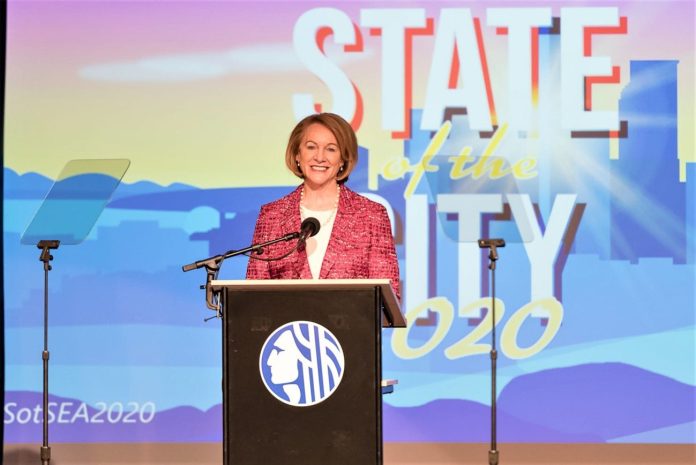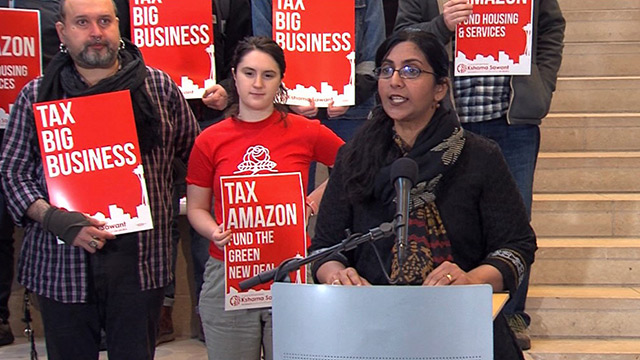
“Being progressive means actually making progress, and we have done it,” Mayor Jenny Durkan boasted in her annual State of the City speech on Tuesday. Halfway through her first term, Mayor Durkan rattled off accomplishments, but laid out a cautious agenda for the year ahead.
Durkan announced a plan to launch census assistance centers to aid in the 2020 Census taking. She also mentioned replacing the soon-to-expire Seattle Transportation Benefit District which augments transit service–although it remains unclear if the Mayor intends to partner with the rest of the county on a ballot initiative (as has been floated) or keeping going it alone.
Meanwhile, the new initiatives Durkan teased were relatively small, like a $300,000 emergency fund for small businesses and a job training program for Seattle students.
“We need to help small businesses like Muy Macho, my favorite taco truck in South Park,” Durkan said. “[L]ast year, Muy Macho faced some hard times. Fortunately, the City was able to help. Judith [the owner] qualified for a $25,000 grant through our emergency Stabilization Fund, so she could replace her coolers and keep serving her customers and get the business back on track.”
The two programs could stabilize a dozen struggling business and help a few students lucky enough to score one of the 40 paid summer internships at leading employers like Amazon, Expedia, and SEIU 775 and another 80 internships at the City of Seattle. Keeping the Mayor’s favorite taco truck from going under is nice, but the stabilization program is tiny band-aid in a city of 750,000 residents and counting with skyrocketing rents for storefronts and office space.
Housing needs and the payroll tax fight
The Mayor also heralded wins on housing and homelessness.
“Since becoming Mayor–again–we have invested in nearly $1.5 billion of affordable housing,” Durkan said. “Now, that is progress. But that’s not enough. We need more tools as a region.”
Durkan then segued into her plan to work with state legislators to authorize a “progressive business tax,” effectively a payroll tax on large employers. If successful in Olympia, the King County Council could pass the tax and raise $120 million per year–perhaps more if amended–for housing and homelessness-related services countywide.
That plan hit a speed bump this week as the original bill offered died in committee, but a new iteration that funnels 0.1% proceeds to the State is still alive via a cutoff exemption for bills with state budget implications. The payroll tax rate is up slightly to 0.25% in the latest version. That reprieve won’t last long though, since the legislative session will end on March 12th. The contentious issue of preemption of further Seattle business taxes still looms; it’s not yet in the bill, but much of the business support of the effort has been conditioned on its inclusion.
Can Durkan outmanuever the Left?
If the King County business tax effort fails, Mayor Durkan’s response to the housing affordability crisis will lack a major new revenue source. The recently launched regional homelessness taskforce will continue to be overwhelmingly funded by Seattle, while governance will be tilted toward suburban leaders who are shirking on their responsibility to fund the response and use evidence-based best practices. Moreover, Mayor Durkan and King County Executive Dow Constantine’s effort to outmaneuver Councilmember Kshama Sawant on the issue she staked her reelection campaign on will have failed.

Councilmember Sawant is leading a campaign which she has dubbed Tax Amazon to tax big business via a Seattle-only 1.7% payroll tax directed at the top 3% highest grossing companies. The movement has garnered support from groups such as 350 Seattle and Seattle Transit Riders Union. Sawant’s tax seeks to raise $300 million per year, but only would apply within city limits. The bulk–75%–is dedicated to building social housing while 25% would go to electrifying homes that use oil or gas for heating and cooking–a plank of the Seattle Green New Deal.
Sawant responded to the Mayor’s barbs via a public statement.
“Last I checked, being progressive means successfully fighting to make progress, not being the corporate establishment’s tool in opposing virtually any proposed progressive measure,” Sawant said. “Congrats to our grassroots movement for winning the historic expansion of tiny house villages yesterday–a week after winning the first-in-the-nation winter eviction moratorium, despite this Mayor’s bitter opposition, and despite opposition from some of the politicians on the City Council.”
About that $1.5 billion…
The Mayor’s $1.5 billion marquee figure counts all funds (federal, State, nonprofit, etc.) “leveraged” by about $250 million in City funds, a press release from the Mayor’s Office clarified. It also seems to include investments from 2017, a year when Durkan was mayor for 34 days, taking over for interim Mayor Tim Burgess just in time to announce the Office of Housing awards in December.
The Seattle Office of Housing claimed a haul totaling $100 million in 2017, $75 million in 2018, and $110 million in 2019–buoyed by to one-time Mercer Megablock proceeds. The Seattle Housing Levy, resoundingly passed by voters in 2016, is the steadiest source of those Office of Housing funds at $29 million per year. Seattle’s 0.5% Real Estate Excise Tax brings in a similar amount in a good year. Incentive zoning and the Mandatory Housing Affordability (MHA) program together brought in $16.3 million in 2019, and that may increase as more projects fall under MHA requirements.
What these three major housing funding sources share in common is that they didn’t originate with Mayor Durkan. The last batch of MHA rezones were signed by Durkan, but it was the Seattle City Council that did the tough work of laying the groundwork and shepherding them through over the course of several years.
Fledgling transportation momentum
One initiative that Mayor Durkan did see through was a ridehailing fee hike, dubbed the Fare Share Plan, that is expected to bring in roughly $10 million per year for affordable housing in coming years, and set aside further proceeds for transit and a driver resolution center. That transit funding seemingly has rescued the embattled Center City Streetcar project, that Mayor had formerly seemed bent on blocking before a change of heart.
Passage of the Fare Share Plan and lowering speed limits to 25 mph on arterial streets signal a stronger transportation direction than had initially been apparent in her administration–with several street safety projects (most dramatically with 35th Avenue NE) getting the mayoral ax.
The Mayor continued to paint a picture of “a region where you never have to get in a car to work, to play or explore this great city… with fewer cars, less climate pollution, and more safe and convenient ways to get around.” It’s a good vision, but the devil is in the details and the follow through.
One policy that never got a mention in the speech was congestion pricing, which Mayor Durkan had previously presented as a first-term priority key to her climate strategy. Inevitably, congestion pricing will face a tough political fight to pass, but that fight is made tougher by the Mayor’s plan to run it as a ballot initiative before voters ever get to see it in action and reap the benefits. The City will be conducting outreach this year to craft the specifics of the proposal and build support, but it seems unlikely that it’ll be on a ballot before 2022–unless the Mayor is ready to stake her reelection campaign on it in 2021.
Mayor likes diversionary programs, just not LEAD
Another program not mentioned was Law Enforcement Assisted Diversion (LEAD). The Mayor is engaged in a fight to block $3.5 million in LEAD funding the Seattle City Council added to the 2020 budget, with the aim of the widely-acclaimed program’s operation. Since the Seattle City Charter does not bestow the Mayor with a line-item veto, it’s a legally suspect move to not execute the LEAD funding in the approved budget. To justify the foot-dragging, Durkan has ordered a consultant review of the program, which has become a signature move for her.
Despite her LEAD opposition, the Mayor did make mention of another diversionary program called Choose 180 in her speech, and painted diversion in a positive light.
“As part of the City’s ongoing efforts to engage in diversion strategies and youth violence prevention, the 2020 budget includes investments to expand the successful Pre-Filing Diversion Program through the Choose 180 program,” the Mayor’s office added in a companion press release.
Why LEAD is different is anybody’s guess. The Mayor declined to comment in a Stranger article on the turmoil the funding fight is causing at LEAD.
Overall, Durkan called for an “all of the above” public safety approach that also includes hiring more police officers, tougher sentences for repeat offenders, and, although this went unsaid, a continued reliance on sweeping homeless camps to keep local homeowners and businesses content.
Educational investments
Another focus of the speech was education. Mayor Durkan touted the education levy passed in 2018, which expanded access to preschool and post-secondary education. In the process, she seemed to throw a little shade on presidential contenders like Senators Bernie Sanders and Elizabeth Warren who each have campaign planks forgiving student debt and offering free tuition at public universities.
“And while others talk about providing new opportunity for young people and preventing crushing student debt, we acted,” Durkan said. “We gave two free years college for every Seattle public high school student.”
So far, the Mayor said 400 students had taken advantage of the free tuition program–officially titled Seattle Promise Job and Career Pathways. For the upcoming year, almost 1,800 students sent interest forms to Seattle Colleges, she added.
Whether two years of free college will be enough to launch these students on their way remains to be seen. It’s better than nothing, but I suspect many are still hoping for broader reform.
This article has been updated with the section on LEAD.
Doug Trumm is publisher of The Urbanist. An Urbanist writer since 2015, he dreams of pedestrian streets, bus lanes, and a mass-timber building spree to end our housing crisis. He graduated from the Evans School of Public Policy and Governance at the University of Washington in 2019. He lives in Seattle's Fremont neighborhood and loves to explore the city by foot and by bike.


